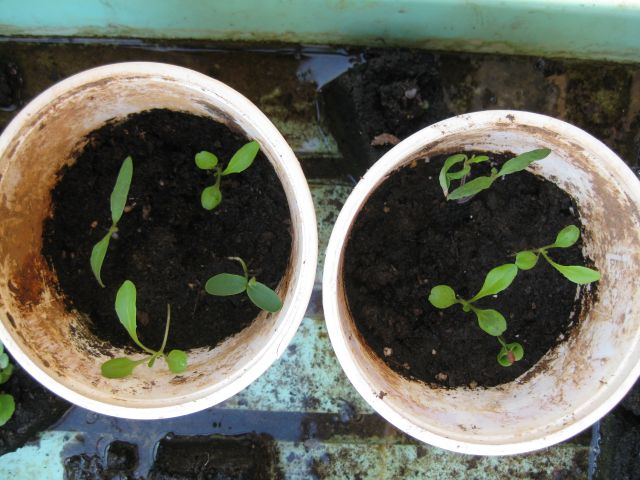My two main nutrition inputs are leaf bags from my neighbors, which I pick up in the fall, and horse manure (well rotted/decomposed) from the stables. I have read articles about manure loaded with chemicals which wreaked havoc in growers’ plots. I have not experienced this problem but, to put this concern behind me, I ran a simple test.
I took two empty 32oz yogurt containers, drilled holes in the bottoms for drainage, and filled one 50% with recently collected manure and the other with compost. I then added another 30% sphagnum peat to both, so they were both about 80% full. Into each pot I planted two lettuce seedlings, one tomato seedling and one black locust seedling, all comparably sized. The compost pot is my control pot. Watered and left for a week plus in my greenhouse.
The result to date, is that all the seedlings in both pots are doing fine. Some of the seedlings in the manure pot appear better developed.

I shall keep an eye on both pots but I do not expect a change in the results. Which means the manure I collect is ok. Or is it? Driving in this morning I listened to a recent Paul Wheaton podcast and he mentioned that wormers used on horses to control gastrointestinal parasites, subsist in the manure and may kill earthworms. I have a well established hardworking earthworm labor force specialized in compost making. So this podcast tidbit gives me something new to think about. I could add a couple of worms to each pot and lid it (to prevent them from escaping) and see how they are doing in a couple of weeks.

Paul Wheaton says many things. Not everybody agrees with him.
Horse manure is one of my primary sources of composting material, too, and I have never had a problem with any of the (many!) medications that horses are dosed with. I think a lot depends on how hot the composting process is allowed to get: For all the arguments against hot composting, its one overwhelming advantage is that the heat pretty-much destroys all those complex pharmaceutical molecules (along with Fly eggs, parasitic worms, etc.)
Of course this is assuming a hot composting process. For long-cool composting,… not so much 😉
Good point. I did place comparably sized 4″ worms into the control and the manure pots. And 3 days later I investigated the pots and found there was a worm in the control pot but not the manure pot. I then found a dehydrated worm near the pots. So the worm in the manure pot was either naturally adventurous and wanted to explore, or he took a whiff of the manure identified the dewormer and determinedly got out. My test was inconclusive. But your point is a good one – even if the manure has problems when received, the composting process should help remedy this, and my worms only get stuck in when the heating cycle is over, so they should be ok as well.